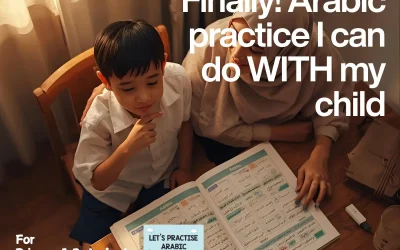Hello, dear parents and young Arabic learners! We know that learning Arabic in Singapore can be challenging, especially with limited exposure to the language outside of Madrasah classes. But fear not! The key to success lies in the power of consistent practice. Let’s dive into how you can compensate for limited language exposure and help your child excel in Arabic.
First and foremost, set a daily Arabic practice routine.
Consistency is crucial in language learning, and even just 20-30 minutes of focused practice each day can make a world of difference. Create a manageable schedule that works for your family, and stick to it as much as possible. Make it a fun and rewarding experience, and watch your child’s Arabic skills blossom!
Now, let’s talk about the importance of using structured Arabic workbooks and practice materials.
These resources provide a clear roadmap for learning, with progressively challenging exercises and activities. As parents of primary Madrasah students, we highly recommend “Let’s Practice Arabic! Level 1” – it’s a fantastic workbook designed specifically for young learners in Singapore. Trust us; it’s a game-changer!
Of course, don’t forget the value of active participation in Madrasah Arabic classes.
Encourage your child to ask questions, volunteer answers, and engage fully in classroom activities. This not only reinforces learning but also builds confidence and speaking skills. Help your child prepare for classes by reviewing materials beforehand and discussing new concepts together.
At home, create opportunities for Arabic speaking and listening practice.
Role-play everyday scenarios using Arabic conversation scripts, or listen to Arabic audio materials together. Make it a fun, interactive experience that the whole family can enjoy. You might be surprised at how quickly your own Arabic skills improve alongside your child’s!
Another great way to boost Arabic practice is by joining language clubs or study groups.
Collaborating with peers provides motivation, support, and invaluable conversation practice. If your child’s Madrasah doesn’t offer such groups, consider starting one yourself or connecting with other parents to create an Arabic learning community.
Finally, celebrate your child’s progress and achievements along the way.
Learning a new language is a journey, and every milestone deserves recognition. Create a reward system, display their Arabic work proudly, and offer plenty of praise and encouragement. Your support and enthusiasm will fuel their motivation to keep practicing consistently.
Remember, dear parents and young learners, the power of consistent Arabic practice is immense. By implementing these strategies and using resources like “Let’s Practice Arabic! Level 1,” you’ll be amazed at how much progress your child can make, even with limited language exposure. So let’s embrace the journey, stay committed, and watch your little Arabic superstars shine brightly!





